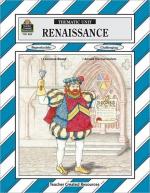|
This section contains 4,117 words (approx. 14 pages at 300 words per page) |

|
Growth of Italian.
During the fourteenth century Dante Alighieri (1265–1321), Francesco Petrarch (1304–1374), and Giovanni Boccaccio (1313–1375) laid the foundations for Italian as a literary language. Around 1300, Dante became one of the first Europeans to discuss a subject that would become increasingly important during the Renaissance. In his On the Vulgar Tongue he considered what style was most appropriate for writers who decided to compose their works in their own native language, rather than in Latin. Dante advocated his own "sweet new style," an elegant form of medieval Italian that was intended to please both the mind and the ear. In his great masterpiece, The Divine Comedy, Dante used the "sweet new style" to record his imaginary pilgrimage through hell, purgatory, and paradise. He intended this masterpiece, which he completed shortly before his death in 1321, to be a summation of everything he had learned in his life...
|
This section contains 4,117 words (approx. 14 pages at 300 words per page) |

|




